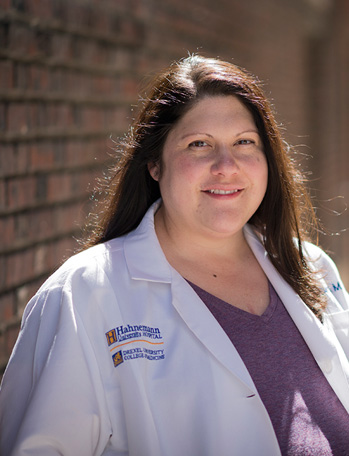"This is not the place for a girl from Idaho," I thought as my hands shook around the chest tube I was preparing for imminent use. I was in a community hospital in West Philadelphia during my emergency medicine residency, and was caring for a young man who had just been shot in the chest. I recall holding his hand while he awaited transfer to the nearest trauma center. At this moment of shared vulnerability, my sense of "otherness" — of geographical and situational misalignment — dissipated along with my waning adrenaline surge. "Of course this is where you belong," I thought.

Erica Harris completed the Drexel/Hahnemann Emergency Medicine Residency program before joining the College. She is currently pursuing her master's in public health at Drexel's Dornsife School.
Frequent relocation throughout my life has had a cumulative effect of reinforcing this sense of otherness wherever I land. I have often cursed this as a sense of cosmic homelessness. As I learned to care for patients with backgrounds so wildly different from my own that it gave me pause, I began to see my relative placelessness as a distinct advantage. From my perch of feeling a little bit out of place everywhere, I was able to observe my environment as a perpetual outsider looking in. Being removed from the implications of my own judgments allowed for a degree of raw honesty that would otherwise be hampered by a sense of belonging to what I observe.
In my career in medicine, this has led me to freely examine how we relate to one another — as colleagues, as physician and patient, and as a whole system — and how our interactions are so innately framed and motivated by who we are. This examination took on new depth when I moved to Philadelphia for my emergency medicine residency at Drexel. Here I had the opportunity to work with the Healing Hurt People™ violence intervention program and meet many young people who have been violently injured. I have had the privilege of meeting many of them outside of the trauma bay, where I have learned about the richness and complexity of their lives. This includes not only the sustained, intergenerational trauma to which they have been exposed, but also their resilience and grace.
In the wide space between knowing trauma victims as people and knowing them as patients in the trauma bay, I began to feel a startling disconnect. I felt vulnerable to assumptions about these young
assault victims: What did they do to get themselves hurt? They don't look like they want help … Despite my training in trauma-informed care and my personal experiences with young victims, these narratives crept into my subconscious. In these moments, I realized that I am a part of this, too. I am not an innocent bystander after all.
It turns out that I can never remove myself from my own observations, and neither can anyone else. Even as rational, educated and truly empathetic professionals, we are all subject to the same societal messages that determine our unconscious thoughts towards each other and those for whom we care. My new goal in medicine is not to rise above the noise of unconscious bias, but rather to recognize, appreciate and tame it. In my role as an educator, I feel particularly obligated to highlight to trainees how bias shapes our medical decision making, especially in the emergency department where rapid assumptions can save a life as easily as they can lead to catastrophic error.
As I learn new techniques for confronting the inevitability of my bias, it turns out that accountability within our shared space is more liberating than the illusion of separateness of which I was once proud. This shared space is where I actually belong.
— Erica J. Harris, MD
Assistant Professor of Emergency Medicine
Director, Injury & Public Health Fellowship